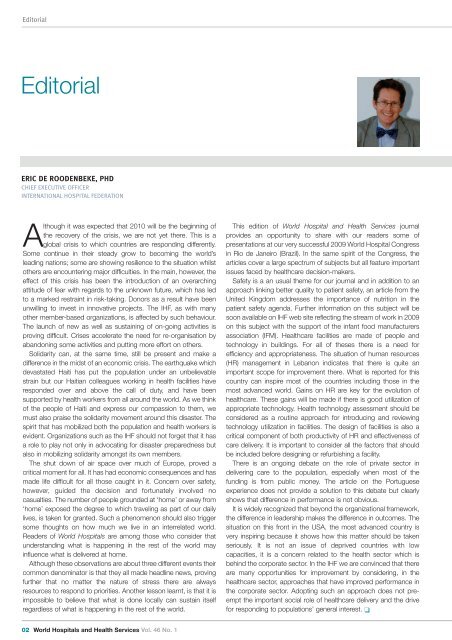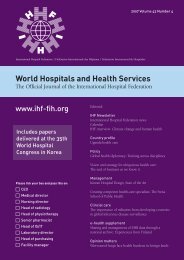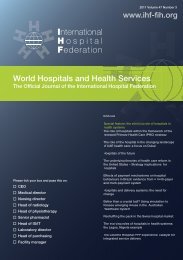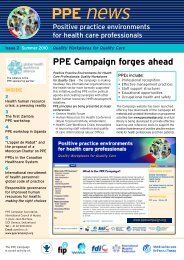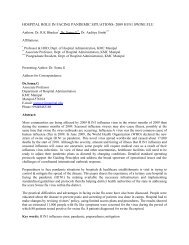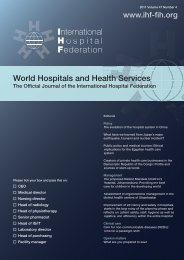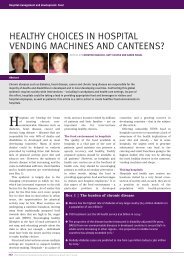vol46.1 LR.pdf - International Hospital Federation
vol46.1 LR.pdf - International Hospital Federation
vol46.1 LR.pdf - International Hospital Federation
Create successful ePaper yourself
Turn your PDF publications into a flip-book with our unique Google optimized e-Paper software.
Editorial<br />
Editorial<br />
ERIC DE ROODENBEKE, PHD<br />
CHIEF EXECUTIVE OFFICER<br />
INTERNATIONAL HOSPITAL FEDERATION<br />
Although it was expected that 2010 will be the beginning of<br />
the recovery of the crisis, we are not yet there. This is a<br />
global crisis to which countries are responding differently.<br />
Some continue in their steady grow to becoming the world’s<br />
leading nations; some are showing resilience to the situation whilst<br />
others are encountering major difficulties. In the main, however, the<br />
effect of this crisis has been the introduction of an overarching<br />
attitude of fear with regards to the unknown future, which has led<br />
to a marked restraint in risk-taking. Donors as a result have been<br />
unwilling to invest in innovative projects. The IHF, as with many<br />
other member-based organizations, is affected by such behaviour.<br />
The launch of new as well as sustaining of on-going activities is<br />
proving difficult. Crises accelerate the need for re-organisation by<br />
abandoning some activities and putting more effort on others.<br />
Solidarity can, at the same time, still be present and make a<br />
difference in the midst of an economic crisis. The earthquake which<br />
devastated Haiti has put the population under an unbelievable<br />
strain but our Haitian colleagues working in health facilities have<br />
responded over and above the call of duty, and have been<br />
supported by health workers from all around the world. As we think<br />
of the people of Haiti and express our compassion to them, we<br />
must also praise the solidarity movement around this disaster. The<br />
spirit that has mobilized both the population and health workers is<br />
evident. Organizations such as the IHF should not forget that it has<br />
a role to play not only in advocating for disaster preparedness but<br />
also in mobilizing solidarity amongst its own members.<br />
The shut down of air space over much of Europe, proved a<br />
critical moment for all. It has had economic consequences and has<br />
made life difficult for all those caught in it. Concern over safety,<br />
however, guided the decision and fortunately involved no<br />
casualties. The number of people grounded at ‘home’ or away from<br />
‘home’ exposed the degree to which traveling as part of our daily<br />
lives, is taken for granted. Such a phenomenon should also trigger<br />
some thoughts on how much we live in an interrelated world.<br />
Readers of World <strong>Hospital</strong>s are among those who consider that<br />
understanding what is happening in the rest of the world may<br />
influence what is delivered at home.<br />
Although these observations are about three different events their<br />
common denominator is that they all made headline news, proving<br />
further that no matter the nature of stress there are always<br />
resources to respond to priorities. Another lesson learnt, is that it is<br />
impossible to believe that what is done locally can sustain itself<br />
regardless of what is happening in the rest of the world.<br />
This edition of World <strong>Hospital</strong> and Health Services journal<br />
provides an opportunity to share with our readers some of<br />
presentations at our very successful 2009 World <strong>Hospital</strong> Congress<br />
in Rio de Janeiro (Brazil). In the same spirit of the Congress, the<br />
articles cover a large spectrum of subjects but all feature important<br />
issues faced by healthcare decision-makers.<br />
Safety is a an usual theme for our journal and in addition to an<br />
approach linking better quality to patient safety, an article from the<br />
United Kingdom addresses the importance of nutrition in the<br />
patient safety agenda. Further information on this subject will be<br />
soon available on IHF web site reflecting the stream of work in 2009<br />
on this subject with the support of the infant food manufacturers<br />
association (IFM). Healthcare facilities are made of people and<br />
technology in buildings. For all of theses there is a need for<br />
efficiency and appropriateness. The situation of human resources<br />
(HR) management in Lebanon indicates that there is quite an<br />
important scope for improvement there. What is reported for this<br />
country can inspire most of the countries including those in the<br />
most advanced world. Gains on HR are key for the evolution of<br />
healthcare. These gains will be made if there is good utilization of<br />
appropriate technology. Health technology assessment should be<br />
considered as a routine approach for introducing and reviewing<br />
technology utilization in facilities. The design of facilities is also a<br />
critical component of both productivity of HR and effectiveness of<br />
care delivery. It is important to consider all the factors that should<br />
be included before designing or refurbishing a facility.<br />
There is an ongoing debate on the role of private sector in<br />
delivering care to the population, especially when most of the<br />
funding is from public money. The article on the Portuguese<br />
experience does not provide a solution to this debate but clearly<br />
shows that difference in performance is not obvious.<br />
It is widely recognized that beyond the organizational framework,<br />
the difference in leadership makes the difference in outcomes. The<br />
situation on this front in the USA, the most advanced country is<br />
very inspiring because it shows how this matter should be taken<br />
seriously. It is not an issue of deprived countries with low<br />
capacities, it is a concern related to the health sector which is<br />
behind the corporate sector. In the IHF we are convinced that there<br />
are many opportunities for improvement by considering, in the<br />
healthcare sector, approaches that have improved performance in<br />
the corporate sector. Adopting such an approach does not preempt<br />
the important social role of healthcare delivery and the drive<br />
for responding to populations’ general interest. ❏<br />
02 World <strong>Hospital</strong>s and Health Services Vol. 46 No. 1


